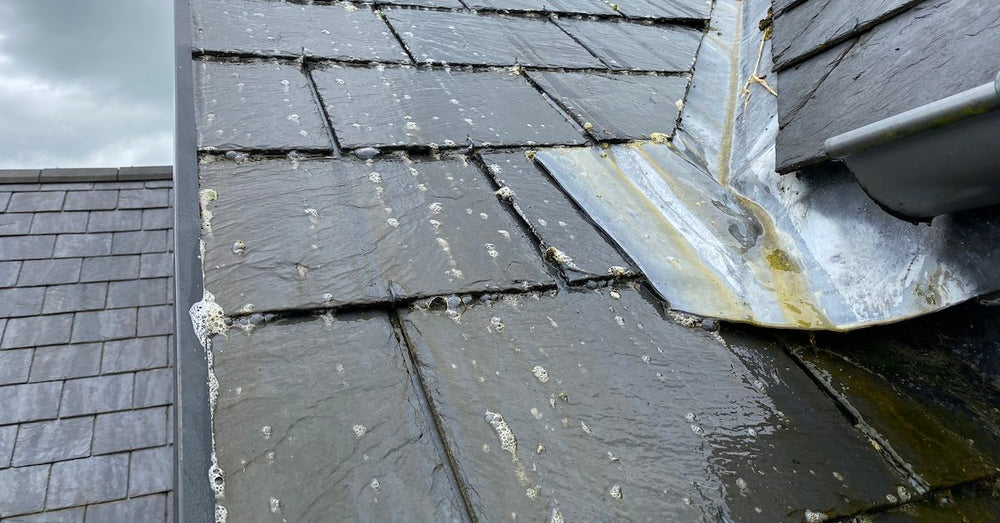
A common question soft washing contractors are asked when tendering for a contract is, "How long will my property stay clean after being soft washed?"
By applying the principles of Benz “Clean and Maintain” softwash systems soft washing contractors can confidently tell their customers to expect two to three years, on average, before visible re-colonisation appears. Sometimes much longer. Some roofs, for example, can remain clean for up to 5 years.
What is capillary action?
“Capillary action is the ability of a liquid to flow in narrow spaces without the assistance of, or even in opposition to, external forces like gravity” (Wikipedia.org)
The density of a softwash chemical is directly related to its capillary action. The less dense the chemical, the greater will be the capillary action. This is also known as the "wetting" ability of a sofwash product.
It is the power behind the residual protective effect of Benz Bio Cleanze – which hypo cannot offer.
What are the chemical characteristics of Benz Softwash biocides?
The chemical make up of Benz Lightning Cleanze makes it denser than water (25% greater, as is the case with all sodium hypochlorite based softwash products). So it tends to work more on the surface. In this context it is highly effective in killing, through the process of oxidation, the surface colonisation or “biofilm”.
Benz Bio Cleanze however, is less dense than water (11% less) and so is able to penetrate more deeply into the surface of the render – even more deeply than water itself can due to its low surface tension – thus killing any remaining spores that were still alive deep in the substrate of the render.
When applied to a pre-cleaned porous surface (using Lightning Cleanze, Tornado Cleanze, or a jet washer) a substantial amount of the active ingredient – DDAC – will remain in the render. This residue will slowly biodegrade over time with the onset of damp conditions but only when it comes into contact with living spores and other organic material.
Quick tip: Even when Bio Cleanze has biodegraded to 95% of its original strength, there will still be sufficient DDAC remaining for it to continue to have residual biocidal properties that help prevent re-colonisation.
How can the propensity of a surface to re-colonise be reduced?
It's important to re-treat surfaces with Bio Cleanze when the first signs of re-colonisation appear, or even before.
Frequent re-treatment means that less active ingredient will be broken down by organic material. Therefore a higher strength of the DDAC biocide will remain in a porous surface to give strong residual protection against re-colonisation.
Quick tips:
- We’ve found that applying Bio Cleanze before re-colonisation can occur gives the best long-term results.
- A good sales point when offering your customers a "Clean & Maintain" ongoing maintenance programme: Frequent re-treatments with Bio Cleanze will reduce the long-term cost to your customer by avoiding the time-consuming need to remove the build up of heavy organic growths. And of course they get to enjoy a permanently clean property.
How can soft washing contractors help their customers to help themselves?
Trees, shrubs and hedges near a property always encourage re-colonisation, as do plant pots on footpaths and patios.
A rendered wall that has had plant pots placed close to it may become re-colonised, especially if the plants are allowed to grow large and even climb up the wall.
When a contractor returns to a property it will usually be obvious where some of the re-colonisation is coming from.
Prevention measures – including educating customers about the importance of, for example, keeping paths and patios free from organic matter, such as grass cuttings and fallen leaves – can then be put in place, ensuring further treatments will be even more effective.
Information about re-colonisation should be passed on to your customers, so they can carry out the cutting back of trees, hedges, shrubs and so on.
Sometimes re-colonisation can come from the build up of growths on a roof or parapet capping, which may find its way down a render because of poor lead flashing or guttering work.
Growths on roofs may fall to the ground and then re-colonise the render from the ground up, starting with colonising the path or patio they fall on.
The same is true for gaps between the capping stones of walls, which spores like to grow in.
Quick tip: Few members of the general public realise the importance of keeping their property free from organic growth build up, so educating them is a service in it's own right.
Contractors who take a little time to help their customers in this way generate goodwill, show themselves as being knowledgeable professionals, and increase the likelihood of their customers wanting them to return, generating repeat business.
Surfaces will remain cleaner, for longer, following a treatment with Bio Cleanze. This is due to the combination of pre-cleaning – with Lightning Cleanze or Tornado Cleanze, and/or jet washer (but do not jet wash render or soft stone ) – and subsequent regular maintenance treatments.
Adopting our "Clean and Maintain" softwash systems means the financial costs to the customer can be far less than the alternatives, e.g. painting. And of course, their property will be kept permanently clean and returned to a low maintenance finish as originally designed.
The contractor also benefits by building up a long-term repeat business serving delighted customers. A win-win situation for both customer and contractor.
We hope this information is helpful and sincerely wish you great success in your soft washing business,
Team Benz



Leave a comment